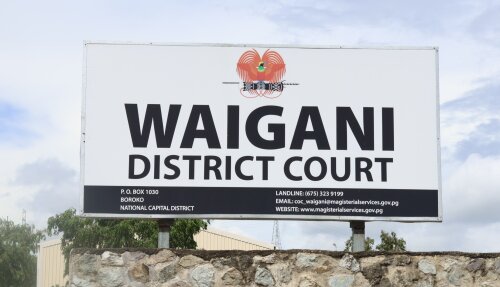Best Commercial Litigation Lawyers in Papua New Guinea
Share your needs with us, get contacted by law firms.
Free. Takes 2 min.
Or refine your search by selecting a city:
List of the best lawyers in Papua New Guinea
About Commercial Litigation Law in Papua New Guinea
Commercial litigation in Papua New Guinea refers to the process of resolving disputes that arise out of business and commercial transactions through the court system. These legal disputes may involve contracts, business partnerships, company law matters, property transactions, debt recovery, and other business-related issues. The laws and procedures governing commercial litigation are aimed at ensuring fairness, transparency, and justice in commercial dealings. Cases are generally handled by the National Court of Papua New Guinea and may be subject to specific commercial court rules.
Why You May Need a Lawyer
People and businesses often require legal assistance in commercial litigation for a variety of reasons. Common situations include breach of contract claims, disputes between business partners, shareholder disagreements, commercial property disputes, and debt recovery issues. Engaging a lawyer is important because commercial cases can be complex, with significant financial implications and strict procedural requirements. A lawyer's expertise can help you understand your rights, evaluate your chances of success, and represent your interests effectively in negotiations or in court.
Local Laws Overview
In Papua New Guinea, commercial litigation operates under a combination of statutes such as the Companies Act, the Commercial Registry Act, the Contract Act, and the Civil Procedure Rules. Matters are usually heard before the National Court, which has broad jurisdiction over civil and commercial matters. Key local legal principles include the enforceability of contracts, limitation periods for filing claims, procedures for serving legal documents, rules regarding evidence, and alternative dispute resolution processes like mediation. It is crucial to be aware of the specific requirements and timelines for each type of commercial dispute, as well as any recent changes to court procedures or commercial law legislation.
Frequently Asked Questions
What is commercial litigation?
Commercial litigation is the process of resolving disputes related to business transactions and commercial relationships through legal proceedings in court.
Do I need a lawyer for commercial litigation in Papua New Guinea?
While it is possible to represent yourself in court, commercial litigation is often complex and it is highly recommended to seek the advice of a qualified lawyer.
What types of disputes are common in commercial litigation?
Common disputes include breach of contract, business partnership conflicts, shareholder issues, employment disagreements, property disputes, and disputes involving the supply of goods and services.
How long does a commercial litigation case take in Papua New Guinea?
The duration can vary widely depending on the complexity of the case, the court's schedule, and whether the dispute is settled before reaching trial. Some cases are resolved in a few months while others may take several years.
Can commercial disputes be resolved without going to court?
Yes, many commercial disputes are settled through alternative dispute resolution processes such as negotiation or mediation, which can save time and costs.
What evidence is needed in commercial litigation?
Evidence may include contracts, written correspondence, transaction records, witness statements, and expert reports, depending on the nature of the dispute.
Are there time limits for bringing a commercial claim?
Yes, there are statutory limitation periods for bringing different types of commercial claims. Missing a deadline can result in losing the right to pursue the case.
What are the court fees involved in commercial litigation?
Court fees depend on the type and value of the claim. Additional costs may include legal representation, expert fees, and costs of gathering evidence.
Can a foreign company be involved in commercial litigation in Papua New Guinea?
Yes, foreign companies that do business in Papua New Guinea or enter into contracts with local entities can be involved in commercial litigation in the local courts.
What happens if I lose a commercial litigation case?
If you lose a case, you may be required to pay the judgment amount and potentially the legal costs of the other party, depending on the court’s order.
Additional Resources
- National Court of Papua New Guinea: The main authority for handling commercial litigation matters. - Papua New Guinea Law Society: Provides information on qualified lawyers and legal practice in the country. - Investment Promotion Authority (IPA): Holds records on businesses and companies operating in Papua New Guinea. - Alternative Dispute Resolution Centre: Offers mediation and other out-of-court settlement services. - Department of Justice and Attorney General: Oversees the administration of justice, including the courts and legal profession.
Next Steps
If you are facing a commercial dispute or believe you require legal support, it is advisable to take the following steps:
1. Gather all relevant documents and evidence related to your case, such as contracts, correspondence, and transaction records. 2. Seek legal advice as early as possible to understand your rights, obligations, and options for resolving the matter. 3. Consult the Papua New Guinea Law Society or another reputable source to find a qualified commercial litigation lawyer. 4. Discuss possible strategies with your lawyer, including negotiation, mediation, or formal court action. 5. Ensure you act within the required time limits for filing claims under Papua New Guinea law. 6. Prepare for potential court appearances by understanding the procedures and what will be required of you.
Taking timely and informed action can help protect your business interests and improve your chances of achieving a favorable outcome in any commercial dispute.
Lawzana helps you find the best lawyers and law firms in Papua New Guinea through a curated and pre-screened list of qualified legal professionals. Our platform offers rankings and detailed profiles of attorneys and law firms, allowing you to compare based on practice areas, including Commercial Litigation, experience, and client feedback.
Each profile includes a description of the firm's areas of practice, client reviews, team members and partners, year of establishment, spoken languages, office locations, contact information, social media presence, and any published articles or resources. Most firms on our platform speak English and are experienced in both local and international legal matters.
Get a quote from top-rated law firms in Papua New Guinea — quickly, securely, and without unnecessary hassle.
Disclaimer:
The information provided on this page is for general informational purposes only and does not constitute legal advice. While we strive to ensure the accuracy and relevance of the content, legal information may change over time, and interpretations of the law can vary. You should always consult with a qualified legal professional for advice specific to your situation.
We disclaim all liability for actions taken or not taken based on the content of this page. If you believe any information is incorrect or outdated, please contact us, and we will review and update it where appropriate.
Browse commercial litigation law firms by city in Papua New Guinea
Refine your search by selecting a city.















